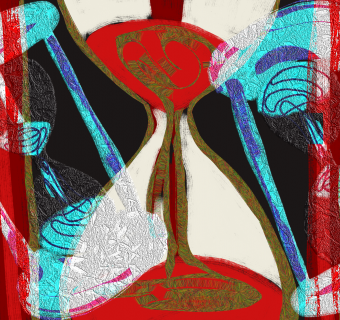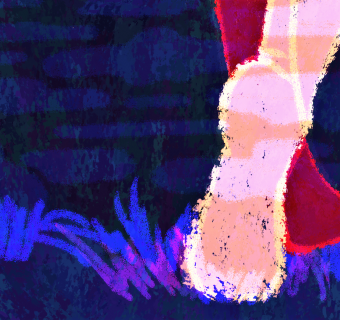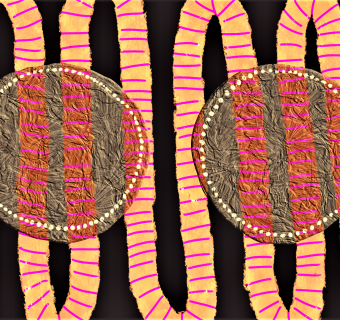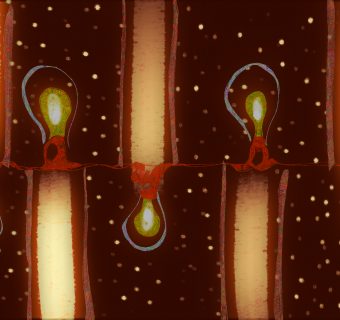This interview has been edited and condensed. Original audio available through author.
Hi, Amber. Please introduce yourself, and tell us about PERIOD @ UVA.
I am Amber Peake, a fourth year from Harrisonburg, Virginia, studying Global Environments and Sustainability.
Nationally, PERIOD is an organization that fights period poverty and stigma through pillars of education and service and advocacy. Through service, we dedicate a lot of our time and effort into raising money for period products and period drives. So that's service, and then education–we've been hosting a lot of general body meetings, and we promote a lot on our Instagram about menstrual myths, and we had a gynecologist come talk to our general body. That was really exciting. And for advocacy, we are really pushing UVA to put menstrual products in all bathrooms, not just women's bathrooms, but also specifically all gender inclusive bathrooms. That's an area that it's a little tricky to navigate because we don't really know UVA’s bylaws. But that's an area that we are continuing to grow in.
There’s a lot of intersectionalities between menstrual education and health, and, like, mental health, or your outdoors life. So we've been partnering with a lot of other organizations on Grounds to bring light to all of these intersectionalities. And it's really helped our organization a lot.
How are you working on the timeline of getting period products into UVA restrooms?
I think there's quite an assumption that all students have access to menstrual resources, which isn't true. UVA is just recognizing that not a lot of our bathrooms do have menstrual products. Figuring out who to talk to at UVA…[there are] a lot of hoops to jump through. I think it's easy to say that some bathrooms have menstrual products, but, like, are they free? Or are they good quality? And why not in all bathrooms, because, from my perspective, I mean toilet paper is in all bathrooms. It’s free, it's considered a necessity–why aren't menstrual products?
A lot of just relentless pushing, but I think it's really necessary in raising awareness for something that should not be taken for granted.
So that's kind of where we are now. We're doing a lot of emailing and reaching out, just trying to put it on the radar, and I guess, increase the discussion of, "hey, this is something that should be brought up at the next UVA meeting of whoever's in charge of it"–because it's tricky to get to the bottom of who actually is the one who coordinates this, especially at an institution our size.
A lot of just relentless pushing, but I think it's really necessary in raising awareness for something that should not be taken for granted.
My first year, it was tough going into the bathroom and then having to realize I didn't have any [menstrual product] on me. And then I'm like, "Oh, no, am I going to spend a quarter?" Or even more like, "It's gonna get stuck in the machine, and then what am I supposed to do?"
That's so true. I had a very similar experience. And I think I was in Clark. And I think I knew that there were period products in Newcomb. But I was like, I mean, I'm in a class in Clark. Am I supposed to walk to Newcomb? Am I supposed to ask a classmate? At the time, I was just unprepared. Like, I didn't put a tampon in my backpack kind of thing. But it's a much bigger issue than that, because menstrual products are so expensive. A box of tampons is, like, $8. And that could equate to, you know, a week of spaghetti and meatballs, like a good solid meal. A lot of people have to make the decision whether they purchase period products, or they purchase a meal. Unfortunately, that is a truth that a lot of people experience. And I really would love to see UVA prioritize…[stocking] accessible, quality products in our bathrooms.
A lot of people have to make the decision whether they purchase period products, or they purchase a meal.
Tell me more about your goals as President of PERIOD @ UVA, at UVA but also in the greater Charlottesville community.
We were a COVID baby starter club. So not a lot of people know who we are yet, and consequently not a lot of people know our initiatives and our goals. A localized goal is just to increase our presence at UVA since we're still kind of small right now. And trying to increase our intersectional approaches, that's a big goal. You know, how do we incorporate non-menstruators into this conversation? How can they play a role and feel important and not feel like there's a stigma for non-menstruators to be talking about menstruation? How can we incorporate mental health advocacy and menstruation? What are the intersectionalities there? And for the Charlottesville community, it's tough because we really would love to have UVA be another resource that community groups can look towards, for support and for volunteer service. So that was really cool, to be able to partner with the Blue Ridge Area Food Bank and know that we are helping menstruators have period supplies. I would really love to have community groups recognize PERIOD as a resource that they can go to to be like, "Hey, we need some products, can you help us?" Early in our organization, I worked a lot reaching out to different community groups letting them know who we are, and what services we can provide. So I think it would be really neat to foster a relationship between menstruators in our broader community, and menstruators in the UVA community.
As a person who has been going to college, who has a period and has had to adjust your schedule sometimes around that, even missing classes because of it–what has your college experience been like, regarding navigating your period?
There will be days during my menstruating weeks, where I'm in a lot of physical pain. I have a heavier period. And I think at the beginning, it was tough–I always called it, like, an illness, like I'm out sick today. But then within the past year or so I started realizing, "No, I'm not ill; I am a menstruating body." It's been a little bit more manageable with Zoom, because you can just pop in online, but I think it was really a call to attention that menstruating is often not considered a valid excuse to miss class. And there are menstruators in all grade levels.
I think it was really a call to attention that menstruating is often not considered a valid excuse to miss class.
This is kind of a tangent, during the pandemic a lot of students in grade school would have school lunches available for pickup. And I thought, Oh, I wonder if menstrual products are available, too, because [when you were in school] you could just go to the nurse and pick up menstrual products if you didn't have any at home. So I started emailing a lot of principals and nurses in the Charlottesville area just being like, hey, maybe just consider putting these in some of the lunch bags for students who may need them. Like it might be something uncomfortable. Someone might not want to discuss that with a parent at a middle school age. I think it takes at least right now a lot of boldness and courage to say, "I'm on my period and my stomach hurts. I can't go to class today," and know in your heart that that's a valid reason not to be in class and [you cannot] be penalized for that academically.
I don't know if you have been to the physics building or, like, in Thornton Hall at the Engineering School–it can be really difficult to navigate UVA buildings in terms of periods – can you speak to that?
Oh my goodness, yes. I think having bathrooms that are visible and in locations that make you feel safe and comfortable are really, really important in design of buildings. I mean, there have been so many times where I just know I'm bleeding through my underwear, and I can't find a bathroom anywhere. But also walking around at night time. It's just one of those things that's in the back of your mind that you don't know.
Yes, another tangent–bathroom design. Some are just not body inclusive. Especially for anyone carrying a child or just spaces that don’t accommodate more than one body size. I have a beef with that. But I do want to ask about people who are menstruators but don't identify as women. Could you speak about gender inclusive bathrooms and getting products integrated into those?
Well, first, I want to say not all women menstruate, and not all menstruators are women. I think that is really important to destigmatizing menstrual conversations because, you know, I think we tend to assume that, "Oh, we only need period products in women's bathrooms," which is very far from the case.
I want to say not all women menstruate, and not all menstruators are women. I think that is really important to destigmatizing menstrual conversations.
I think having [menstrual products] in gender-inclusive bathrooms provides a safe space for anybody who is menstruating or is not menstruating, to recognize that there is a place and there are products available to them. I can't imagine how terrifying it might be to go in and not not be able to know where to get products, not be able to have, you know, the space to be seen and heard in that way. Ideally, I would love to see menstrual products in every single bathroom–women's bathroom, men's bathroom, babies bathroom, gender-inclusive bathroom, every single bathroom. I would love to see that. I think that, again, it’s like toilet paper–you know, wherever there's poop, I think there should be a menstrual product. Also, sometimes, I just would love to see non-menstruators and a lot of men just carry period products with them. Anyone who may need it. That's just something that I would love to see.
But yes, I think we don't talk enough about how menstruating bodies who do not identify as women still have a need that needs to be met. And yes, I think that's part of the fight, too, recognizing that menstruation isn't a woman's issue. It's not a men's issue. It's an everybody's issue.









